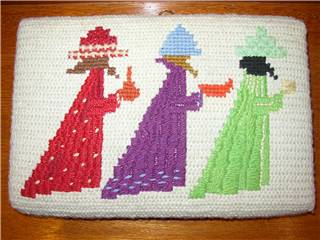Index | November:28th | 29th | 30th | December: 1st | 2nd | 3rd | 4th | 5th | 6th | 7th | 8th | 9th | 10th | 11th | 12th | 13th | 14th | 15th | 16th | 17th | 18th | 19th | 20th | 21st | 22nd | 23rd | 24th | Christmas |
Day Four : 1st December

Isaiah 25:6
On this mountain the Lord of hosts will make for all peoples
a feast of rich food, a feast of well-aged wines,
of rich food filled with marrow,
of well-aged wines strained clear.
7 He will destroy on this mountain
the shroud that is cast over all peoples,
the sheet that is spread over all nations;
he will swallow up death forever.
8 Then the Lord God will wipe away the tears from all faces,
and the disgrace of his people he will take away from all the earth,
for the Lord has spoken.
Now, from Brueggemann (1) page 199:
'The poet imagines that the earth has over it the pall (shroud, sheet) of death, beset by sadness, loss and mourning. The world is held in the grip of death, and has no power to shake it off. But now, the Lord of life will terminate that mood. The verb "destroy" is in the Hebrew "swallow" the same verb as in the next verse. The crisis, however, is more than mourning. The crisis is the active power of death that regularly crowds in upon every chance for life. The poet knows, moreover, that vulnerable folk in the city have no capacity to resist the negations of death.
In order to understand fully what is being claimed here, it is important to reflect on what is meant by death. It is not simply the awareness that we are all going to die. … Death here is rather an active force of negativity that moves to counter and cancel and prevent well-being. So Wildberger nicely observes: "Death is all that circumscribes a life, that limits the life-space of humanity, that diminishes well-being, and that prevents community with human person or God" (Jesaja 13-27, 967 [author's translation]). That is who death is; everyone knows about that power of diminishment that we cannot by ourselves resist. And now the news: God will swallow death like a great sea monster attacking a smaller fish. God will attack this marauding beast and take it in the jaws, crush it, chew it, reduce it, eliminate it, and perhaps spit it out. It is no wonder that in his Easter lyric, the apostle Paul can quote, "Death has been swallowed up in victory" (1Cor15:54).'
page 200
'The poet speaks about nothing less than radical, complete transformation. Biblical faith is not a moral system; it is not a mode of holding on or staying in control. It is rather an act of yielding in the present (as this poet does) to the assurances given for God's future. The poet is indeed shrewd and insightful in concluding that the ultimate act of transformation is to remove "disgrace" from this people — the disgrace of being helpless, powerless, and exploited; the shame of being stepped on and not being able to resist the powers of death. It is the humiliation of being stepped on and not being able to resist the powers of death. It is the humiliation of being, to the bottom of our lives, ultimately inadequate. Now all of that will be overcome.'